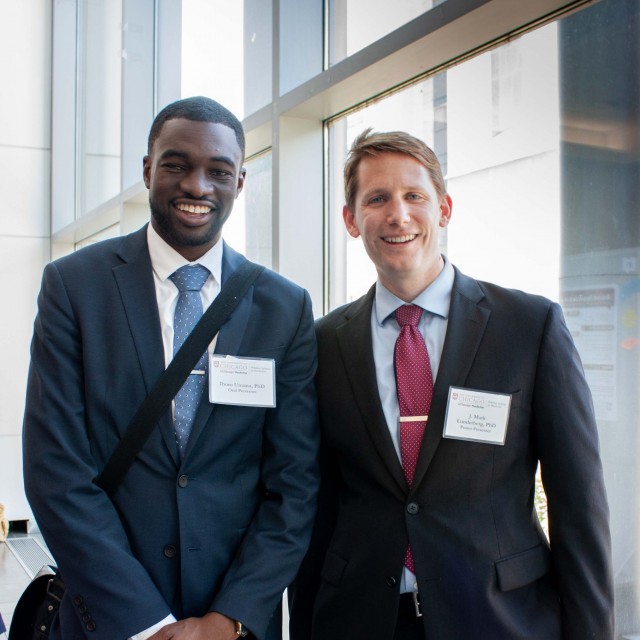Learning Plan
By the beginning of July during Phase 3, students are required to submit a Learning Plan, which outlines their scholarly plans for the Phase 3 year. The Learning Plan provides opportunity for students to express their intended plan and rationale for fulfillment of the minimum required 100 S&D elective units (maximum 300 units).
At this point in the curriculum, students may choose to remain on the same project with the same mentor from the Phase 1 year, or may elect to begin project with a new mentor on a new project, or continue with the same mentor in a different capacity. These intentions, coupled with a concrete plan of action, are communicated to the S&D Steering Committee via the Learning Plan. The Learning Plan indicates how many months (typically 1-3) each student intends to work on scholarly project work, as well as if s/he plans to complete elective coursework relevant to project work, and/or engage in TA opportunities. A minimum of 100 S&D Units is required throughout the MS4 year. Submitting a Learning Plan that is approved by the S&D Steering Committee automatically registers you for your S&D MS4 credits.
Fulfilling Unit Requirements
While it may be easiest - and is usually recommended - to follow a linear path of working with the same project and mentor from your Phase 1 Winter Block, this may not always be the case. Students may diverge from a set plan for myriad reasons related to their project, mentor, or evolving interests. Considering these factors, students have numerous options as to how to satisfy their S&D elective unit requirement.
Scholarly Project Work (100-300 Units)
Students may dedicate from a minimum of 100 units to a maximum of 300 units toward scholarly project work. MEDC 40120 - Scholarship & Discovery (100 - 300 Units) is the elective course in which students register to obtain credit for an S&D project. Once a Learning Plan is submitted and approved, students will automatically be registered for this course.
Students can determine exactly how much time (1 - 3 months) to allocate towards completion of their S&D requirements, as well as which months of the year will be dedicated toward this process. The S&D Team recommends meeting with individual mentors and Track Leaders to discuss the status of any projects and to map specific plans for completion. Many students pursue their S&D work at various points from July through April -- after residency applications are submitted and required clinical rotations are complete, yet prior to the Senior Scientific Session.
Elective Coursework (100 Unit minimum)
Students can take a minimum 100 unit elective to enhance their understanding of a specific area related to their scholarly project or interests. Because interests are diverse, any nonclinical elective may apply to S&D requirements, so long as the student can provide rationale as to how it helps her/him to achieve S&D relevant goals. The elective cannot be a clinical rotation or the same elective that was applied toward the Basic Science requirement.
Senior Scientific Session (100 Units)
Students who elect to present their work at the annual Senior Scientific Session (SSS) will receive an additional 100 elective units towards graduation. Students can indicate on their Learning Plan whether they are interested in participating in the Senior Scientific Session, as well as detail the project on which they plan to present. Please note that although participation in the Senior Scientific Session is not required, it is highly encouraged.
Final Submission
In early spring, a Final Submission assignment is due, which includes a structured Abstract, e-Poster, and Reflection Survey. This assignment serves as the S&D capstone, reflecting the culmination of each student's scholarly activities. Students are asked to submit the work that they feel is most reflective of their Phase 3 scholarly project (i.e., that which was originally proposed in the Learning Plan). If students have worked on more than one project in their M4 year -- and seek feedback on multiple projects -- up to 2 abstracts and 2 ePosters may be submitted.
Abstract
This is a 500 word abstract that summarizes a project that students have done during S&D (either Phase 1 or Phase 3 work). Abstract headings will include traditional research subheadings or descriptions of innovations for those pursuing this type of work in Community Health, Global Health, Medical Education, or Quality & Safety.
e-Poster
The e-Poster may be an update of the student's e-Poster from the Phase 1 S&D Winter Block, or it may be a new e-Poster based on MS4 work.
Reflection Survey
The Reflection Survey is a series of short answer and multiple choice questions about student progress, lessons learned, and suggestions for improvement. This brief questionnaire allows students to formally reflect upon their scholarly work and the impact that it will have on their professional development. Too, this serves as a venue to provide suggestions for the future classes of Pritzker students participating in the S&D curriculum.
